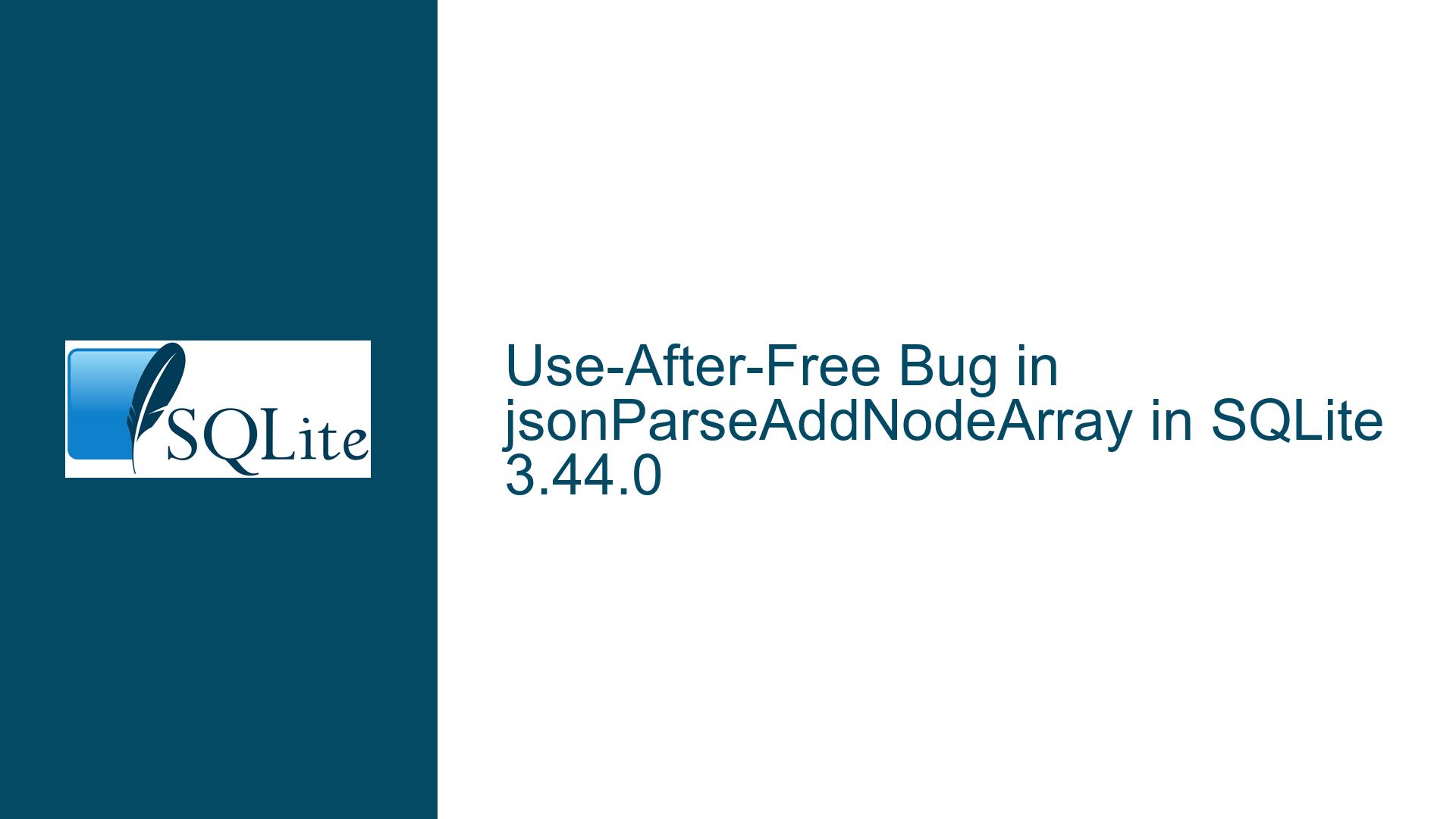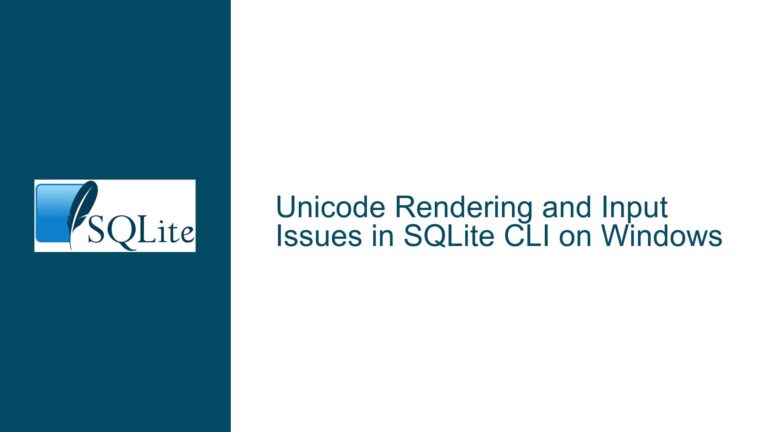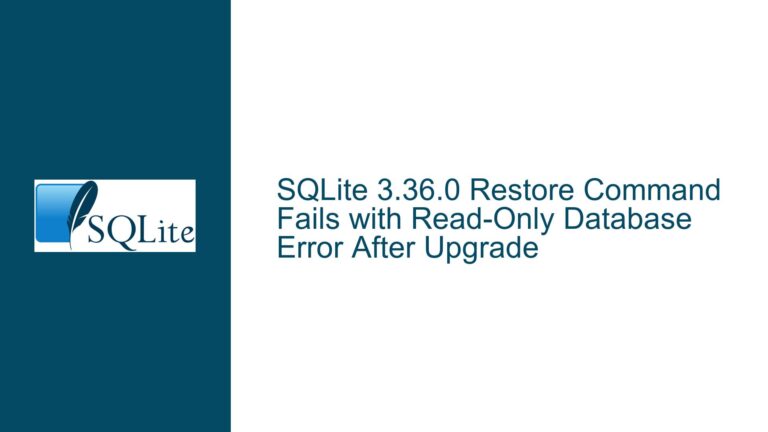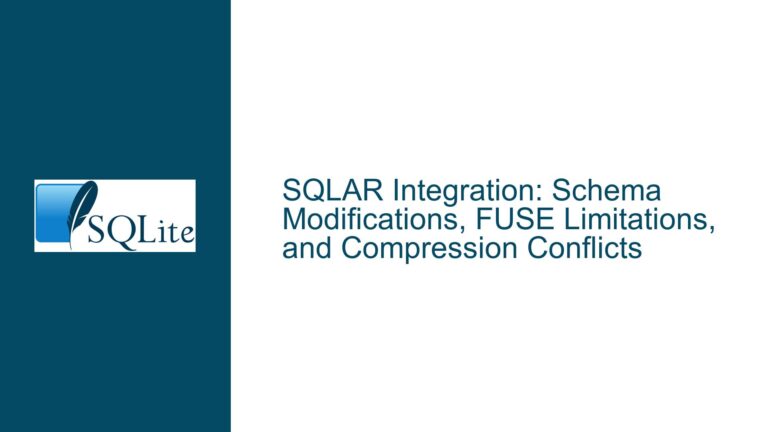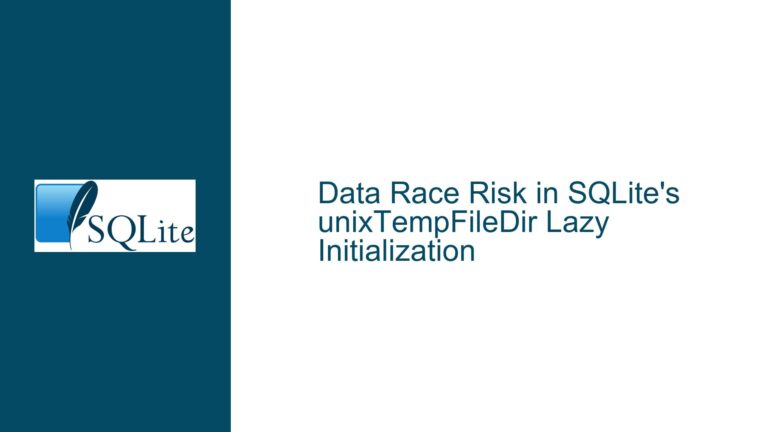Use-After-Free Bug in jsonParseAddNodeArray in SQLite 3.44.0
Issue Overview: Use-After-Free in JSON Parsing Logic
The core issue revolves around a use-after-free (UAF) vulnerability identified in the jsonParseAddNodeArray function within SQLite version 3.44.0. This function is part of SQLite’s JSON1 extension, which provides support for JSON data manipulation. The UAF occurs when the SQLite engine attempts to access memory that has already been freed, leading to undefined behavior, crashes, or potential security vulnerabilities.
The specific location of the bug is in sqlite3.c:202989, where the jsonParseAddNodeArray function is defined. The issue manifests when JSON parsing operations, particularly those involving json_set() and json_replace(), interact with the JSON cache. The JSON cache is a performance optimization introduced in SQLite versions after 3.42.0, designed to store intermediate JSON parsing results to avoid redundant computations. However, under certain conditions, this cache management logic fails, resulting in a UAF scenario.
The bug was reported with a proof-of-concept (POC) script that triggers the issue. The POC involves a complex SQL query that manipulates JSON data using json_set() and json_replace(). The crash occurs when the SQLite engine attempts to access a freed memory region during JSON parsing. The AddressSanitizer (ASAN) report indicates a heap-use-after-free error, confirming the presence of the UAF vulnerability.
Possible Causes: JSON Cache Management and Memory Handling
The root cause of the UAF bug lies in the interaction between JSON parsing functions and the JSON cache. The JSON cache was introduced in SQLite versions after 3.42.0 to optimize JSON operations by caching intermediate parsing results. However, this optimization introduced a new layer of complexity in memory management, which, if not handled correctly, can lead to memory-related issues such as UAF.
The issue arises when the jsonParseAddNodeArray function attempts to add a node to a JSON array. During this operation, the function may access a memory region that has already been freed. This can happen due to several reasons:
Incorrect Cache Invalidation: The JSON cache may fail to properly invalidate or update cached entries when JSON data is modified. This can lead to situations where a cached entry points to a memory region that has been freed.
Race Conditions in Memory Management: If multiple JSON operations are executed concurrently, there may be race conditions in how memory is allocated and freed. This can result in a situation where one operation frees a memory region while another operation is still using it.
Improper Handling of JSON Node Lifetimes: The
jsonParseAddNodeArrayfunction may not correctly manage the lifetimes of JSON nodes, leading to situations where a node is freed while it is still being referenced.Edge Cases in JSON Parsing: The POC script provided in the discussion involves a complex JSON manipulation that may trigger edge cases in the JSON parsing logic. These edge cases may not have been adequately tested, leading to the UAF bug.
The UAF bug is particularly concerning because it can lead to crashes, data corruption, or even security vulnerabilities if exploited. The ASAN report indicates that the bug is reproducible and can be triggered under specific conditions, making it a high-priority issue for SQLite developers.
Troubleshooting Steps, Solutions & Fixes: Addressing the UAF Bug
To address the UAF bug in jsonParseAddNodeArray, several steps can be taken to diagnose, troubleshoot, and ultimately fix the issue. These steps involve a combination of code analysis, testing, and applying patches or workarounds.
1. Code Analysis and Debugging
The first step in troubleshooting the UAF bug is to perform a detailed code analysis of the jsonParseAddNodeArray function and its interactions with the JSON cache. This involves:
Reviewing the JSON Cache Implementation: Examine how the JSON cache is implemented, including how entries are added, updated, and invalidated. Look for any inconsistencies or potential issues in the cache management logic.
Analyzing Memory Allocation and Deallocation: Trace the memory allocation and deallocation patterns in the
jsonParseAddNodeArrayfunction. Identify any instances where memory is freed while still being referenced.Checking for Race Conditions: If the issue is suspected to be related to race conditions, review the code for any potential concurrency issues. Ensure that memory management operations are properly synchronized.
Testing Edge Cases: Use the POC script provided in the discussion to test the JSON parsing logic under various conditions. Look for any edge cases that may trigger the UAF bug.
2. Applying Patches and Updates
The SQLite development team has already addressed the UAF bug in the 3.43.2 patch release. Therefore, one of the most effective solutions is to update to the latest version of SQLite. This will ensure that the bug is fixed and that the JSON cache management logic is functioning correctly.
Updating to SQLite 3.43.2 or Later: If you are using a version of SQLite affected by the UAF bug (i.e., versions after 3.42.0 but before 3.43.2), update to SQLite 3.43.2 or later. This will include the fix for the UAF bug.
Verifying the Fix: After updating, verify that the UAF bug is no longer present by running the POC script and checking for any crashes or memory-related issues.
3. Implementing Workarounds
If updating to a newer version of SQLite is not immediately feasible, there are several workarounds that can be implemented to mitigate the UAF bug:
Disabling the JSON Cache: If the UAF bug is related to the JSON cache, consider disabling the cache as a temporary workaround. This can be done by modifying the SQLite source code to bypass the cache for JSON operations. While this may impact performance, it can help avoid the UAF bug until a proper fix is applied.
Using Alternative JSON Libraries: If the JSON1 extension is not essential for your application, consider using an alternative JSON library for JSON parsing and manipulation. This can help avoid the UAF bug altogether.
Limiting JSON Operations: If the UAF bug is triggered by specific JSON operations, consider limiting or avoiding those operations in your application. This can help reduce the risk of encountering the bug.
4. Preventing Future Issues
To prevent similar issues from arising in the future, consider implementing the following best practices:
Thorough Testing: Ensure that all JSON parsing and manipulation logic is thoroughly tested, including edge cases and complex scenarios. Use tools like AddressSanitizer to detect memory-related issues during testing.
Code Reviews: Conduct regular code reviews to identify potential issues in memory management and cache handling. Encourage developers to pay close attention to memory allocation and deallocation patterns.
Monitoring and Logging: Implement monitoring and logging to detect any memory-related issues in production environments. This can help identify and address issues before they lead to crashes or security vulnerabilities.
Staying Up-to-Date: Regularly update to the latest versions of SQLite to benefit from bug fixes and performance improvements. Stay informed about any known issues or vulnerabilities in the SQLite codebase.
By following these troubleshooting steps, solutions, and fixes, you can effectively address the UAF bug in jsonParseAddNodeArray and ensure that your SQLite-based applications are secure and stable.
